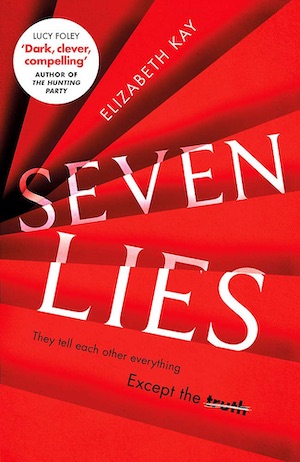Elizabeth Kay’s debut domestic noir novel is an immersive journey into a friendship of some 20 years’ duration. Jane and Marnie have been inseparable since age 11, through college, through their first London jobs, and while they could finish each other’s sentences, narrator Jane doesn’t hesitate to explain the many ways in which they are different.
Marnie is light, she says, while she is dark. Marnie is tall, beautiful, outgoing, much beloved. Jane is small, plain, without a lot of love in her life, and constantly bracing for rejection. Thus, it’s to her surprise that she meets a perfect man, leaves her and Marnie’s apartment to live with him, and marries him. Before the relationship has a chance to go stale around the edges, he is killed by an errant taxi, and Jane must crawl through her grief alone. Or almost so. There’s her mother, in a care home with advancing dementia; there’s her anorexic sister Emma – her mother’s favourite – who, if Emma had any resources to help anyone, should be used to help herself. And there’s Marnie.
Marnie, too, meets someone, the successful, wealthy, charming Charles. Jane loathes him and he seems to know it, subtly tweaking her at their regular Friday night dinners. Marnie writes a food blog and posts videos of her cooking; reader and viewer numbers are rising, and advertisers are taking notice.
Jane, by contrast, had what appeared to be a rising career in retail, but after Jonathan dies, she takes time off. When she returns to work, her department has been disbanded, and she is now assigned to the most thankless task imaginable, leading the customer complaints department.
Still, there’s Marnie. And, irritatingly, Charles. When Marnie reveals they have decided to get married, she, of course, wants her best friend’s approval. ‘You think we’re right for each other, don’t you?’ Jane swallows hard and tells her first lie. ‘Yes, I do.’
Saying anything else, anything that reveals how much she hates Charles, would wreck their friendship, she’s sure, but, in retrospect, that first lie led to all the others, each more consequential than the last. Consequential for Marnie, for Charles, and for Jane herself. ‘If I had been honest – if I had sacrificed our love for theirs – then Charles would almost certainly still be alive.’
So, from page 10 of Seven Lies onwards, you know where this is going, yet author Elizabeth Kay effectively strings you along as the box Jane has constructed for herself becomes smaller and smaller. Interestingly, throughout, she addresses her audience directly, with little asides like, ‘you see,’ ‘you understand,’ ‘I want to tell you something now,’ and so on. Thus, Kay lets Jane cleverly draw you in, become her ally, and creates a false sense of collaboration.
Whenever an author uses the second person – the ‘you’ – as much as Kay does, you (now I’m doing it too!) have to wonder, whom is she addressing? It’s an intimate conversation she’s having with someone, but what are the circumstances that enable this conversation to happen?
Does it take place in a police interview room? That is certainly a likely possibility, given everything that happens. Is it a conversation with the annoying journalist doggedly determined to uncover a sensational story? Her first headline is ‘Lesbian lovers kill their husbands’ – false from the first word; and both deaths are adjudged accidents. The body of the story claims they are living the high life off their dead husbands’ wealth. This is a salacious lie, but the press… Or is it a confession Jane makes to her mother, convinced the woman will never remember enough of it to make a difference? By the time the answer finally comes, you will know how much it was needed.
While Kay describes a London where young upwardly mobile (they hope) professionals congregate, it’s a story that could play out almost anywhere. What’s missing is much of a sense of Jane’s work and how much of her time it takes up. Not much, it appears.
The close-in perspective never gets boring, as Jane has the capacity to surprise, to insinuate, and while you may peg her right away as an unreliable narrator, nothing she does seems out of character or discordant with her world view. She sees things through a particular, distorted lens, and, as Jane herself would say, ‘you understand’.
Like this? More of crime fiction’s tangled webs in The Lying Room by Nicci French or Little Liar by Lisa Ballantyne.
Sphere
Print/Kindle/iBook
£3.99
CFL Rating: 5 Stars
